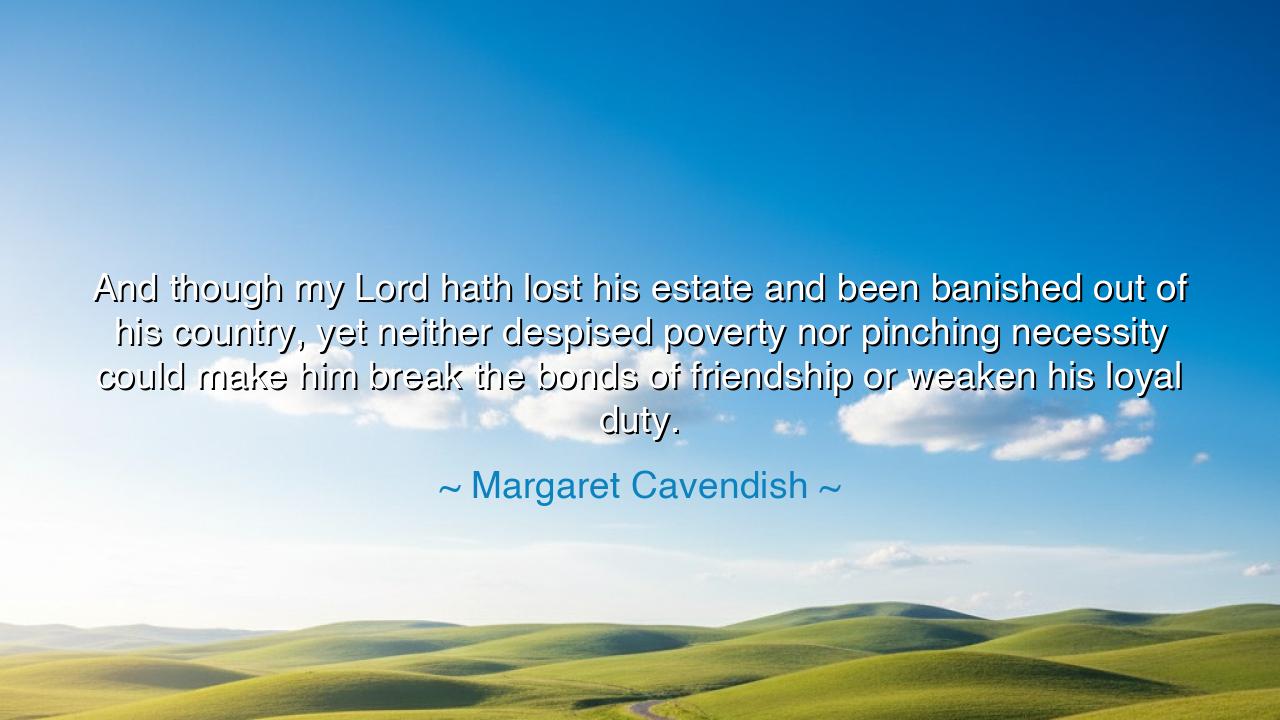
And though my Lord hath lost his estate and been banished out of
And though my Lord hath lost his estate and been banished out of his country, yet neither despised poverty nor pinching necessity could make him break the bonds of friendship or weaken his loyal duty.






In the words of Margaret Cavendish, we behold a jewel of devotion set amid the rough stones of adversity: “And though my Lord hath lost his estate and been banished out of his country, yet neither despised poverty nor pinching necessity could make him break the bonds of friendship or weaken his loyal duty.” This is no mere ornament of language — it is a testament to loyalty, honor, and the unyielding spirit that stands firm when fortune has fled. Cavendish speaks not of comfort, but of steadfastness; not of abundance, but of the heart’s grandeur in the face of ruin. Her words rise like a hymn to those who remain faithful when the world has turned cold.
To understand the meaning of this saying, one must see beyond its regal phrasing to the soul of its truth. Cavendish, writing in the seventeenth century, lived in a time when men and women were tested not by ease but by exile, not by praise but by privation. Her husband, William Cavendish, Duke of Newcastle, had fought for King Charles I during the English Civil War. When their cause was defeated, he was stripped of wealth and title, cast into exile, and left with little but his dignity. Yet in his poverty, he did not barter honor for safety, nor forsake those he had loved and served. Thus his wife, in immortalizing his spirit, gave the world a portrait of a man who, though outwardly fallen, stood inwardly unbroken — a victor in loyalty if not in fortune.
This, then, is the heart of her teaching: that true friendship and duty are not bought by prosperity. The bonds of affection that endure through hardship are the rarest and purest kind, for they are tested in the crucible of necessity. Many will call themselves friend when the table is laden and the hall bright with laughter. But when the fire burns low and the night is long, few will sit beside you. Cavendish reminds us that the noblest souls are those who remain when there is nothing to gain but the quiet satisfaction of fidelity.
Think of the Roman general Cicero’s friend, Atticus, who stood by him when the winds of politics turned deadly. When Cicero fell from favor, accused and condemned, many fled from him in fear of their own ruin. But Atticus, though cautious by nature, sent aid, letters, and comfort even in danger to himself. His loyalty did not waver because his friend’s fortune had failed. It was not wealth or position that bound them, but virtue, that rarest tie of human hearts. Such examples, like Cavendish’s words, burn like torches across the centuries — lights to guide us through the dark corridors of our own times.
The origin of such steadfast love lies in the recognition that friendship and duty are not contracts of convenience but covenants of the soul. When Cavendish wrote of her lord, she spoke as both witness and philosopher. In her eyes, loyalty was a form of greatness, not measured in gold or favor, but in the refusal to betray one’s truth. She knew, as all wise hearts do, that adversity is the truest measure of character. For when stripped of wealth, we see what remains — and if love, honor, and friendship still stand, then nothing of true worth has been lost.
There is a heroism in such constancy, quiet yet unshakable. It is the heroism of those who do not bend when the world commands them to yield; who keep their word when every reason tempts them to break it. The ancients would have called such a one magnanimous — great-souled. To stand by a friend in exile or defend a fallen cause is not folly, but nobility. For though kingdoms fall and fortunes rot, the memory of loyalty endures like carved marble in the halls of time.
Let this be the lesson for all who listen: Be as the steadfast Cavendish describes — let neither poverty, shame, nor exile make you forsake your honor or betray your companions. If you give friendship, give it wholly; if you swear duty, keep it through storm and silence alike. The world may call you foolish for your constancy, yet time will call you noble. Faithfulness is the armor of the soul — it rusts in comfort, but gleams in hardship.
And so, dear listener, remember this: the worth of your loyalty is measured not when it is easy to give, but when it costs you dearly. Stand beside your friends when all others flee; guard your word as though it were gold; and count no loss too great if honor remains your companion. For those who live thus, though banished or broken by the world, walk with the immortals — their names written not in sand, but in the eternal book of the faithful heart.






AAdministratorAdministrator
Welcome, honored guests. Please leave a comment, we will respond soon